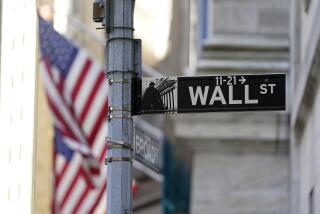The Money Traders : For Currency Specialists in Downtown Los Angeles, Trading Dollars, Deutsche Marks and Yen Can Mean Making or Losing Huge Sums in Seconds
- Share via
When the sun rises in Los Angeles, London is returning from lunch and Tokyo is preparing for bed. But for 12 Security Pacific currency traders on the 19th floor of the California Plaza Building in downtown Los Angeles, time is a continuum measured not by minutes but in dollars. They work in a computerized world of instant communication, where reality merges with rumor and money is traded around the clock in $5-million and $10-million chunks.
Big banks trade in money to make money. Because the value of the dollar fluctuates constantly in relation to other currencies, a trader can make a profit by buying up dollars when the value is low and exchanging them for another currency when it’s high. In theory, that value is a measure of U.S. economic health and is determined by our productivity and the trade balance. In fact, a pessimistic economic report or even a rumor about the President’s health can send the dollar reeling. With currency rates constantly being recalculated, the trader’s rule is to “buy on rumor and sell on fact”--or stand to lose huge sums in seconds.
Richard Lloyd is manager of Security Pacific’s foreign currency exchange, the largest on the West Coast. He is a wiry, well-dressed Englishman with an Errol Flynn mustache and an energetic personality. He rips a summary of a New York Times story from the Reuters financial news wire. “The Reagan Administration announced today that it wants the (value of the) dollar to decline still further,” it says.
“What does this mean for the yen?” Lloyd yells out.
“Down 40 points over the last half hour,” says Dennis Mayfield, 32, his eyes fixed on a bank of screens showing the rates of major currencies. A trader at Security Pacific for 10 years, Mayfield has a decidedly relaxed manner. “Same story on the Dow,” he adds, nodding toward a scrolling electronic message board.
“Says here the rate could drop more, and the government won’t intervene,” Lloyd says.
“The scary part is if they (White House officials) come out and confirm it,” says Frank Diaz, who specializes in trading Eurodollars.
“Then we’ll sell dollars,” Lloyd says. “Everyone will sell dollars.”
Sal Coccaro, an intense, 32-year-old New Yorker who trades British pound sterling, hangs up his telephone: “Retail sales are in, up 4.4%.”
“But over 3% of that is December auto sales,” Lloyd says. “The dollar / yen (rate) is going down the tubes. Get me a quote on the deutsche mark,” he barks when a Munich bank offers to buy $5 million worth of West German currency.
“That’ll be difficult because of the weather in Europe,” says another trader. “There’s even snow in London.”
Lloyd says he’ll call a French bank. After a 10-second conversation, he sells the Munich bank deutsche marks that, earlier that day, Security Pacific had bought at a lower price. The profit: $3,500.
“Check your Reuters!” Lloyd yells at 8 a.m. when Reuters moves a brief report from the morning White House press briefing. The Administration, it says, is not trying to lower the dollar’s value.
Phones erupt as banks recalculate their offers. Moments later, the phones fall abruptly silent when the Dow Jones wire gives its version of the same briefing: The White House won’t comment.
The uncertainty brings a chorus of oaths from squawk boxes linked to outside currency brokers. Tossed telephone receivers boomerang back to their owners on 12-foot flex cords.
“But, Rick,” Mayfield says, pointing to a new story coming through, “Larry Speakes just denied the Times story.”
“He said it wasn’t authorized, but he didn’t deny its substance,” Lloyd corrects. “It’s in the last ‘graph.”
A trader reports that a major New York bank isn’t answering its phones.
“Well, we won’t answer outside lines either,” Lloyd fumes. “Let’s wait until everything settles down.”
But as morning becomes afternoon, the only thing that settles downward is the value of the dollar. “The dollar’s down 7 1/2% against the mark since Christmas,” one trader notes, consulting a tattered sheaf of graph paper. “I can’t even see the dollar,” another adds. “It’s fallen completely out of bed. Gotta be those damn speculators in Chicago.”
“A Japanese bank in London just called its L.A. branch and said the Bank of Japan is predicting the dollar / yen will drop to 150,” 28-year-old Mike Bernal reports, slamming down his phone. The tip eerily coincides with a fire alarm, whose warble is completely ignored. “Sell dollars!” Lloyd screams, throwing a pencil in the general direction of Mayfield. “When all the (Japanese) wake up in three hours, the dollar’s really going to start falling,” he says.
At 2 p.m., Security Pacific’s Tokyo and Wellington, New Zealand, branches take over most of the currency exchange duties, and Los Angeles traders begin totaling their transactions. “Drop another nickel in the till,” Mayfield laughs as he hands Lloyd a final sales voucher bringing the bank an extra $5,000 profit.
“How do you do that every day?” Coccaro scowls. “While I’m scraping around for trades that net $2,000, you’re bringing in deals for 5 and 10.”
“You got the wrong currency, pal,” Mayfield smiles, heading for the door.
The traders who remain lean across their computers and trade high fives. The day may have been bad for the dollar, but Security Pacific traded currencies worth $1 billion and earned a profit of more than $300,000.
More to Read
Inside the business of entertainment
The Wide Shot brings you news, analysis and insights on everything from streaming wars to production — and what it all means for the future.
You may occasionally receive promotional content from the Los Angeles Times.









